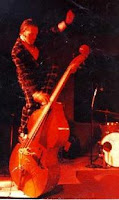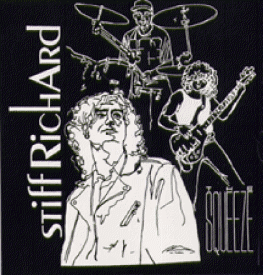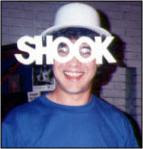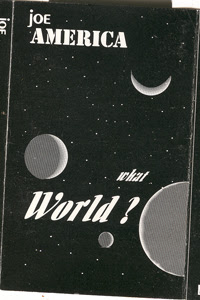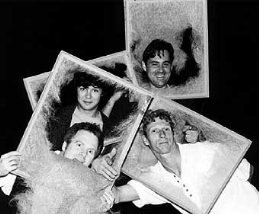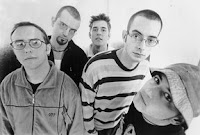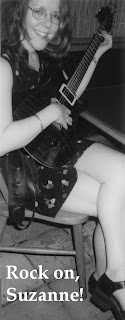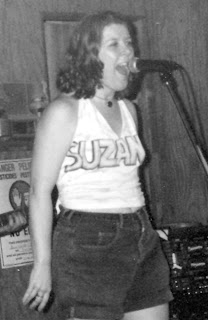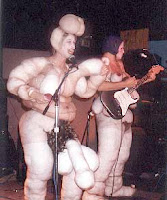![]()
Many years ago, there was a man living on the
Southside who decided the
Richmond Music Journal was offensive to his children, although I think he was actually divorced and not living with his children at the time. He would go into places like Plan 9 on
Midlothian Turnpike and the Barnes and Noble on Huguenot (both locations are gone now), and complain that the paper was obscene and needed to be removed. They ignored him at Plan 9 since they knew him and knew he was a complainer, and at Barnes and Noble, they removed the papers from the box in the front foyer, but then put them back after he left. After all, they were a book store and not about censorship.
It all boiled down to the word "cocksucker" used as an adjective on the front page and a photograph of a band that dressed up in fat, naked people costumes.
The guy went to the Chesterfield Commonwealth Attorney's Office. I think the attorney who was assigned the case thought I was a kid and scaring me would solve the problem. He would try to convince me I had to report to his office for a tongue lashing from him and a "Chesterfield County detective" (
oooh, scary!), and then, terrified, I would behave after that. I knew he couldn't actually make me visit him legally.
I was really annoyed when he called. Back then I wasn't working anywhere, living on food stamps and temp jobs, and didn't care if a dozen Keystone
Kops pulled up and put me in jail. When you've got nothing to lose, even this kind of notoriety is helpful. When you have family, a mortgage, and all that stability stuff to protect, being a renegade or a rebel isn't as easy. So I was ready to go. Bring on the handcuffs, Chesterfield County! The newspaper
The State, a start-up that couldn't decide if it wanted to compete against
Style Weekly or the
Times-Dispatch, already had the ACLU on speed dial on my behalf.
The tape recorder attached to my phone to record band interviews was on autopilot to cut on whenever I answered the phone. It recorded the whole crazy conversation.
I’m an assistant commonwealth’s attorney in Chesterfield county. I was wondering if you’d be willing to sit down and talk with me and a detective from the Chesterfield County police department, and I’ll tell you what this is about. You probably already know. We have received complaints involving the Music Journal, and I have been assigned to investigate it along with the Chesterfield County police department. And I have looked into it and I wanted to discuss it with you. It is not our intent at this time to bring any charges. But I would like to sit with you and discuss with you what the complaints are about and whether or not they can be resolved.Are you aware of
Rolling Stone?
Yes, ma’m.Are you aware of the language in that publication?
Yes, ma’m.Are you aware that publication is available in Chesterfield County?
I’m sure it is. Yes, ma’m.Has this parent picked up a
Rolling Stone?
Well, I don’t think they’re giving them away, are they?I don’t give them away. I don’t give them to this man’s children.
I understand that. And believe me, if you sit down and talk with me, I think we can come to an understanding.Are you aware of
Redbook magazine?
Cosmopolitan?
If you don’t want to talk to me, that’s fine. You can tell me that and then we can do this the hard way.I am perfectly willing to take this magazine completely out of Chesterfield County. I do not want people like this reading my publication. It’s not to my advantage at all to have this man or his children reading it. I do not want his children reading it.
Right.All I need to know is where his children saw it and I will deal with that outlet and pull it out of there.
I don’t even know the person who made the complaint.Well, that’s what we need to find out, where this parent found this magazine so I can remove it from his sight.
He is not your concern. He himself is not going to bring any action. None that I know of. All I can tell you is I have been assigned by the Commonwealth Attorney of Chesterfield County to look into this. I have done that. I’ve talked to police officers. If I can meet with you and tell you what the concern is, then it probably can be resolved that way.You can tell me right now. What is the concern and I will remove the paper from Chesterfield County.
All right. Well, I’m not asking you to do that. I looked through a number of back articles. I don’t see anything at all wrong with a number of articles, but the complaints were based on the December and January magazines, and that was based on both language and some pictures that were published. I know you’re familiar with the areas I’m familiar with. The cocksucking article.That article was not about
cocksucking per
se. Are you aware that
Redbook and
Cosmopolitan magazine, which are available in Chesterfield County,
instruct women on how to do that? While in my magazine it was only used as a derisive expression for toadying to people.
I read the article and I agree with you.He has more danger from
Good Housekeeping as far as his children learning some procedure he
doesn’t like than he does from my magazine.
I’m not arguing with you about that.I can walk into your office with a load of magazines I’ll purchase at a 7-11 in Chesterfield County, magazines that the cover headlines are visible to children. If you’re buying candy at the counter of the 7-11, all the headlines are right there in front of you.
The point is this...You don’t have to buy the magazines, they’re right there in front of you.
I think it is right on the borderline as far as the type of information. The type of magazines you’re referring to are basically magazines for sale. Yours is not for sale.Since it’s not for sale, is the problem that children are seeing it?
They can pick up your magazine and take it home for nothing. And I don’t know what your opinion is, whether or not you would want your 12 or 13-year-old child to see it.Where is it available in the county where a kid could come on a bicycle alone, get it, and go home? They would have to be with their parents. If their parents don’t see what they’
ve got, I can’t supervise every child in Chesterfield County. But if there is an outlet that children are rushing to so they can read this magazine and learn dirty words that
aren’t already in any publications in their parents’ homes, I’ll be happy to remove it. Like I said, I don’t want people like this reading it, people who are going to go to all this trouble, to call detectives and commonwealth attorneys and report stuff that’s already out there. You know I’m not breaking any new ground here. I’m way behind.
I don’t think you are, either. The question is as to access for young people, whether or not certain portions of these two issues I’ve seen approach going over the line.What’s the other complaint other than cocksucker that
isn’t even used in a sexual context? What photograph are we talking about? The little band Donkey Balls who dressed up like naked fat people?
Right, that one.They look like Cabbage Patch dolls.
That’s your opinion, but other people are going to look at it different. I agree that it’s close. My intent in calling you is saying this. We are getting a number of complaints on it. It can be toned down. I’m not telling you to change your magazine or change your style, but I think more discretion can be used as to what pictures are displayed.My magazine, as you can see, is only about local music. It is very seldom...not every single band that plays music in this town dresses up in naked fat people costumes. So it’s not a usual thing that happens. But you find out where the outlet is, and I’ll be extraordinarily happy to withdraw this paper from that outlet. I don’t really care who reads it. It’s for musicians only. It’s not for children. I will be very happy to put on the front cover of every issue that this is not for children, that parents have a responsibility to make sure their children do not pick this up.
I think in reality we’re talking about 13 and 14-year-olds. They’re not by their mom’s and dad’s side every minute of every day.Well, they should be! I can’t be responsible for these children. They’re going to find stuff all over the place.
But you are responsible for distributing this magazine.And I will be very happy to pull it from wherever I’m banned.
I’m not asking you to do that.Well, you should be. You should be banning it, because I can’t change my editorial policy for one parent in one county. So what we need to do is keep it away from these people. Understand? You realize this is a freedom of speech issue. I've already heard from the
Times-Dispatch about doing a story on it.
I’ve learned a little about that in law school.You realize if you go through with this, the press will pick it up, there’ll be stories, the parents who filed this claim will be ridiculed, just like the people trying to stop Howard Stern.
I don’t know about that. This isn’t New York City! This is Chesterfield County!That’s right. It’s the same thing. How far are they getting with that? How about the parents who protested the XL-102 billboard?
I don’t recall that.The XL-102 billboard that looks like a woman having an orgasm. Remember that?
Oh yeah.Then you know how it goes. These things go nowhere. They create a lot of paperwork. It gets your name in the paper. It produces a lot of notoriety and publicity for the paper, it’s a big, ugly mess, but in the end, it goes down on First Amendment rights. You can’t keep something from publishing.
That’s not true. I can keep something I’ve seen from publishing!So I won’t go into Chesterfield County! I don’t care about Chesterfield County! I’ll pull it out.
Well, that’s fine. If you tell me you’re going to remove it from Chesterfield County, then I don’t have any further business.Just tell me which outlets are causing the problem. I’ll tell the owners of those businesses about people with unsupervised children coming in, and I can no longer be there because of you. And we’ll have no problem. So I need two things from you, your name, title, telephone number, and what outlets were cited. You mind if I tape this conversation?
No, ma’m.Where was the paper found?
The complaint lists Peaches and Digits. Those are the two listed on my complaint.Okay, I’ll talk to the managers there and tell them, and when people come in asking for it, they can tell them to come in to the city or somewhere else.
Okay. That’s fine.So it’s settled? So you can call that parent and tell them I’m not bringing it to Peaches. His kids can come to Peaches and buy music and don’t worry about anything.
All right, ma’m. I’m sorry it worked out like this.I have no problem with this at all because I don’t want people in Chesterfield County reading this paper. It’s not for people like that.
****
end of callThis is the same Chesterfield banning dancing in clubs now, isn't it? Anyway, I don't think Peaches or Digits really cared that much about the cranky customer and I continued to leave the paper there after a month or so. Like I told the attorney, not too many bands performed in naked costumes.
Both Digits and Peaches are gone now, too. I can't take the credit. Napster and
Wal-Mart had more to do with that than me. Eventually I found out who the complainer was because he started sending me threatening faxes, and I traced the telephone number back to him. He was surprised when I called him. We had a long rambling talk, almost two hours, and there was a lot more going on in his life than my newspaper, but complaining about the paper was one area where he felt like he could make a difference. After that phone call, the situation ended. Maybe he just needed to talk to someone.
And oddly enough, at the time, a Chesterfield County police detective was one of my music reviewers, writing under his real name.
Am I to blame now for all that's happened since, the
sextexting in schools, the coaches and policeman who are making dates with
underaged girls on the Internet and cell phone text messages? Did the
Richmond Music Journal destroy the moral fabric of a generation of Chesterfield County children?
As far as bad language goes,
Brick has outdone me since then and they're a free distribution paper. How come the commonwealth's attorney's office isn't summoning Media General down to sit down with a detective and work things out? This all seems so quaint now, as if from a time where I wore a
hoopskirt and had the vapors.
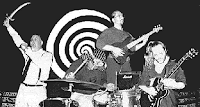 They were guys with day jobs (i.e., some money). Two of them worked for the City of
They were guys with day jobs (i.e., some money). Two of them worked for the City of  The Scariens’ act was, in short, a hocus pocus collage of lyrics, one song sang over the music of another, new lyrics laced into familiar songs, and medleys that went everywhere. “Bury” told me all songs basically have the same chords, so all are interchangeable. (You can extend that philosophy to politics as well.) Costumes were a mix of Middle Eastern garb meets
The Scariens’ act was, in short, a hocus pocus collage of lyrics, one song sang over the music of another, new lyrics laced into familiar songs, and medleys that went everywhere. “Bury” told me all songs basically have the same chords, so all are interchangeable. (You can extend that philosophy to politics as well.) Costumes were a mix of Middle Eastern garb meets 


